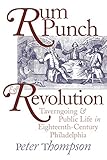Rum Punch and Revolution : Taverngoing and Public Life in Eighteenth-Century Philadelphia / Peter Thompson.
Material type: TextSeries: Early American StudiesPublisher: Philadelphia : University of Pennsylvania Press, [2010]Copyright date: ©1999Description: 1 online resource (296 p.) : 21 illusContent type:
TextSeries: Early American StudiesPublisher: Philadelphia : University of Pennsylvania Press, [2010]Copyright date: ©1999Description: 1 online resource (296 p.) : 21 illusContent type: - 9780812216646
- 9780812204285
- Political culture -- Pennsylvania -- Philadelphia -- History -- 18th century
- Political culture -- Pennsylvania -- Philadelphia -- History -- 18th century
- Taverns (Inns) -- Pennsylvania -- Philadelphia -- History -- 18th century
- Taverns (Inns) -- Pennsylvania -- Philadelphia -- History -- 18th century
- American History
- American Studies
- Books of Regional Interest
- HISTORY / United States / Colonial Period (1600-1775)
- 974.8/1102
- online - DeGruyter
- Issued also in print.
| Item type | Current library | Call number | URL | Status | Notes | Barcode | |
|---|---|---|---|---|---|---|---|
 eBook
eBook
|
Biblioteca "Angelicum" Pont. Univ. S.Tommaso d'Aquino Nuvola online | online - DeGruyter (Browse shelf(Opens below)) | Online access | Not for loan (Accesso limitato) | Accesso per gli utenti autorizzati / Access for authorized users | (dgr)9780812204285 |
Frontmatter -- Contents -- Illustrations -- Introduction -- 1. "For Strangers and Workmen" -- 2 "Contrived for Entertainment" -- 3 "Company Divided into Committees". -- 4. "OfGreat Presumption" -- 5 "Counci1s afState" -- Epilogue -- Abbreviations -- Notes -- Selected Bibliography -- Acknowledgments -- Index -- General Index
restricted access online access with authorization star
http://purl.org/coar/access_right/c_16ec
'Twas Honest old Noah first planted the VineAnd mended his morals by drinking its Wine.-from a drinking song by Benjamin FranklinThere were, Peter Thompson notes, some one hundred and fifty synonyms for inebriation in common use in colonial Philadelphia and, on the eve of the Revolution, just as many licensed drinking establishments. Clearly, eighteenth-century Philadelphians were drawn to the tavern. In addition to the obvious lure of the liquor, taverns offered overnight accommodations, meals, and stabling for visitors. They also served as places to gossip, gamble, find work, make trades, and gather news.In Rum Punch and Revolution, Thompson shows how the public houses provided a setting in which Philadelphians from all walks of life revealed their characters and ideas as nowhere else. He takes the reader into the cramped confines of the colonial bar room, describing the friendships, misunderstandings and conflicts which were generated among the city's drinkers and investigates the profitability of running a tavern in a city which, until independence, set maximum prices on the cost of drinks and services in its public houses.Taverngoing, Thompson writes, fostered a sense of citizenship that influenced political debate in colonial Philadelphia and became an issue in the city's revolution. Opinionated and profoundly undeferential, taverngoers did more than drink; they forced their political leaders to consider whether and how public opinion could be represented in the counsels of a newly independent nation.
Issued also in print.
Mode of access: Internet via World Wide Web.
In English.
Description based on online resource; title from PDF title page (publisher's Web site, viewed 23. Jun 2020)


